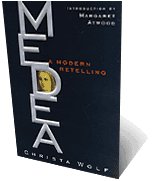| |

This review originally appeared in Salon's Mothers Who Think section within a collection of capsule book reviews.
|
medea
YOU KNOW WHAT I REALLY LOVE? I love it when a clever writer comes along and obliterates a saga we've been telling for thousands of years, offering new perspectives, breathing new life into stories that are sagging from overuse. I thought nothing could top John Gardner's "Grendel," wherein the Beowulf epic was retold from the point of view of the Savage Beast, making the reader feel almost criminal for having ever lent credence to Beowulf's version. But Christa Wolf's "Medea" makes that look like child's play.
Remember Medea? In Greek legend, she's the princess of Colchis who betrayed her father, cast a spell on his servants and (in some versions) killed her little brother, all for the love of Jason. She then helps to steal the Golden Fleece from her own people and flees with Jason and his Argonauts. She later gave a dress to Glauce, Princess of Corinth (whom Jason planned to marry in order to become heir to the Corinthian throne), which burst into flame. Glauce threw herself into a well and drowned, whereupon Medea killed her own children and fled the city of Corinth, leaving Jason to wither and die under the prow of his own ship.
The tale's been told, with some degree of variation, a thousand times. But in essentially every version Medea is an undisputed force of evil. So when I read Margaret Atwood's introduction to this new rendition and discovered that Christa Wolf intended to make me believe Medea was nothing if not a victim, while at the same time turning Medea's story into a pseudo-civics lesson for all generations, I was skeptical. To say she pulled it off would be quite the understatement.
In Wolf's richly updated version, told through the voices of several of the major characters, Medea is gracious and beautiful, while also a talented sorceress who uses her powers as she was taught. She comes from a savage land where the bodies of dead men are hung in sacks from the trees. She fled because her father had betrayed his people; the hapless Jason was simply a convenient escape. She only fell in love and married him once they'd left Colchis with the fleece and their lives barely in tact. When they arrived at Corinth, Jason was taken in by the king while Medea and their twin sons were banished from the castle. (It never occurred to Jason to join them.)
In the book's first chapter Medea tells us, in her strong, sad voice, that she's discovered the king of Corinth's dirty little secret -- the glittering city is actually no less savage than her homeland. Sickened by her discovery, Medea has no intention of sharing what she knows and in fact makes repeated attempts to help the Corinthians and to make a life for herself and her children in this strange land. But once her enemies learn of her discovery, they concoct a plot to turn even her own loyal followers against her.
The book's language is elegant and subtly old-worldy, although an occasional "Hey Jason ..." jars you back into the 20th century. Whether it's the fault of Wolf's original German manuscript or John Cullen's translation, these lapses are thankfully few. And while it may sound hard to believe, the contrast of Wolf's dark-skinned, wooly-haired, barbaric Colchians and her sparkling white Corinthian capitalists is never heavy-handed in its modern-day lesson-ness. But the book's greatest success is the complex and intriguing Medea herself. After knowing her story for 20-odd years, I feel I just finally met her.
PREVIOUS
|
|